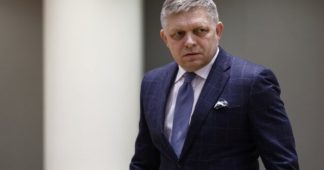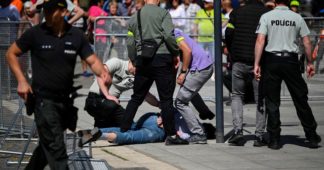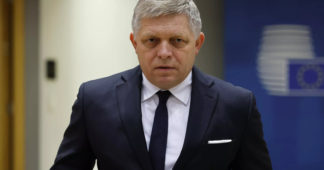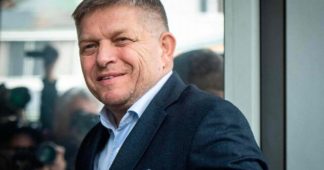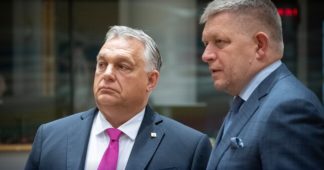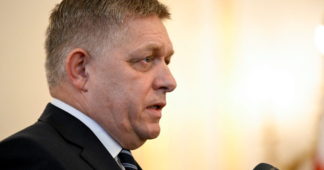By Estelle Nilsson-Julien
The Slovakian prime minister has repeatedly accused the West of fuelling the conflict, claiming the war should be resolved through diplomacy over fighting.
Slovakia’s Robert Fico vowed he would not allow Ukraine to become a member of NATO as long as he was prime minister, in another blow to Kyiv’s aspirations to join the alliance amid Russia’s ongoing invasion.
“I will direct the lawmakers under my control as chairman of the (ruling Smer) party never to agree to Ukraine joining NATO,” he told broadcaster STVR in an interview on Sunday.
“Ukraine’s accession to NATO would be a good basis for a third world war,” added Fico, who has been a vocal critic of the West’s military and financial support to Ukraine since Russia launched its all-out invasion in early 2022.
These remarks came ahead of Fico’s Monday meeting with Ukrainian Prime Minister Denys Shmyhal, which is set to focus on cooperation in energy security and infrastructure.
Referring to his stance on Ukraine’s NATO accession, Fico claimed to be transparent: “This is something that I have openly told Prime Minister Shmyhal, the Americans, and everyone else.”
The Slovakian prime minister has consistently accused the West and the US of fuelling the raging conflict, placing the blame on Europe.
“There is a military conflict in a neighbouring country where Slavs are killing each other, and Europe is significantly supporting this killing, which I just don’t understand,” he said on Sunday.
Fico: The war cannot be resolved militarily
Fico — who survived an assassination attempt in May — is one of Moscow’s closest allies within NATO and the European Union, alongside Hungarian Prime Minister Viktor Orbán.
In October 2023, Fico — who previously resigned as Slovakia’s PM after the murder of investigative journalist Ján Kuciak and his partner — came back into power as part of a coalition with the centre-left Hlas and nationalist SNS parties.
During his election campaign, he insisted that not “a single round of ammunition” would be sent to Ukraine. However, an investigation published by the Slovak Spectator revealed last week revealed that Fico’s government has in fact exported weapons, ammunition and other materials worth at least €112 million to Ukraine.
Fico has repeatedly called for “diplomatic” solutions, stating in the interview on Sunday that “everyone thinks that through Ukraine we will bring the Russians to their knees, but this problem cannot be solved militarily.”
These comments come despite Ukraine’s dwindling artillery, missile and drone stocks affecting their ability to fight.
Although the Kremlin claimed in July it was “open to negotiations with Ukraine”, Russian authorities and state-owned media have repeatedly tried to delegitimise the Ukrainian leader, lobbing a series of allegations against Zelenskyy, such as him being a “Nazi” or a “drug user”.
Earlier this year, Slovakian media reported that Fico’s government was filing criminal complaints against its predecessors over their donation of fighter jets to Ukraine, claiming that the transfers went ahead illegally.
Having previously served twice as prime minister, from 2006 to 2010 and again from 2012 to 2018, Fico is now in his record-breaking third term — despite a plethora of controversies and scandals.
The Slovakian prime minister also took this moment to announce his trip to Moscow in May of next year, calling Russia’s planned commemorations of the 80th anniversary of the end of World War II in Europe a “peace rally”.
Ukraine’s ongoing NATO bid
On the NATO front, the alliance’s new chief, Mark Rutte — who took office last week — has vowed to shore up Western support for Ukraine. His first trip in office was to Kyiv, where he met with Zelenskyy.
Ukraine submitted its official NATO application on 30 September 2022, seven months after Russia began its full-scale invasion.
Despite NATO’s 32-members’ assertion that Ukraine was on an “irreversible” path to membership during a summit in July, the eastern European nation has still not received a formal invitation.
In an interview with the Kremlin-run state TV aired in September, President Vladimir Putin stated it would mean that “NATO countries, the US, European countries, are at war with Russia,” if the West allows Ukraine to use long-range weapons to fight inside Russia.
We remind our readers that publication of articles on our site does not mean that we agree with what is written. Our policy is to publish anything which we consider of interest, so as to assist our readers in forming their opinions. Sometimes we even publish articles with which we totally disagree, since we believe it is important for our readers to be informed on as wide a spectrum of views as possible.
